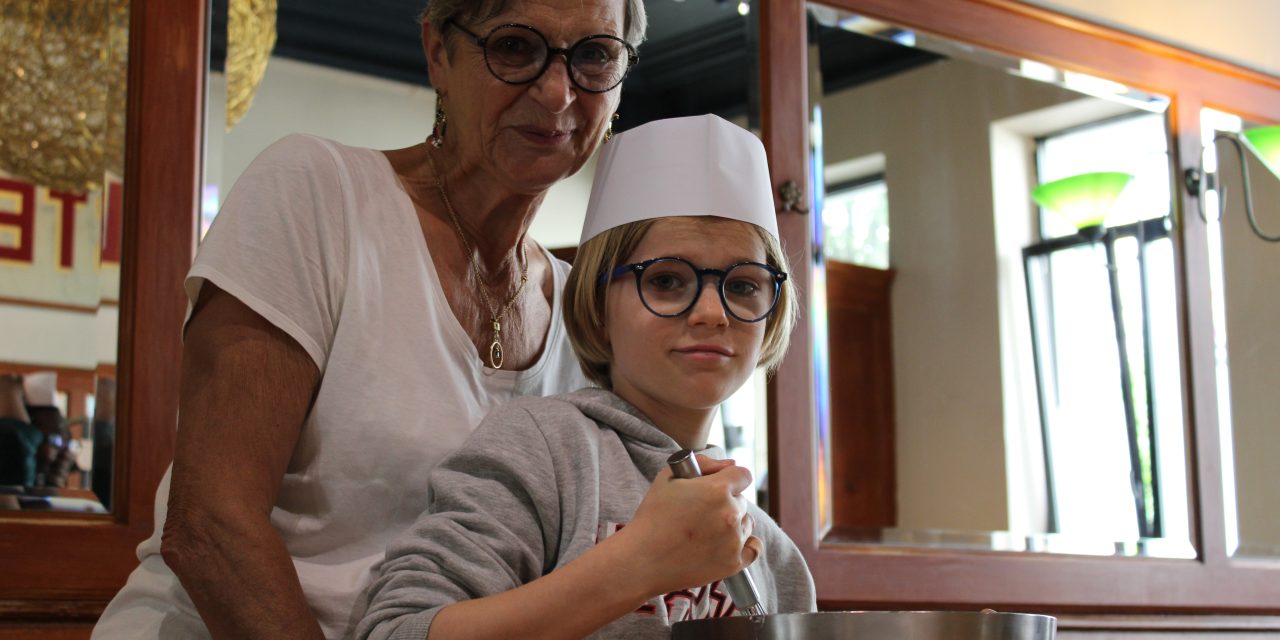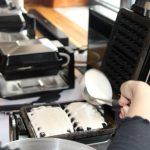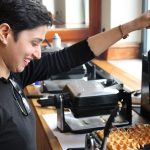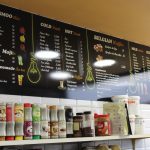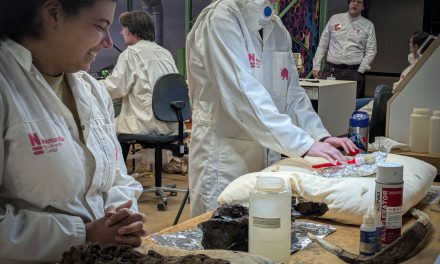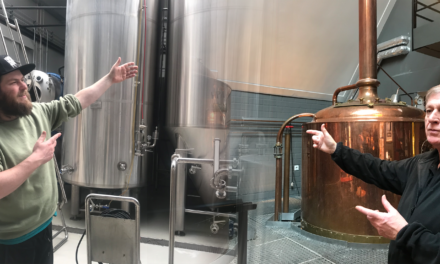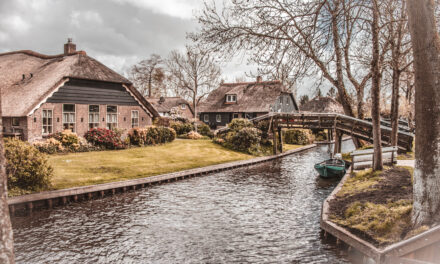Tourism is an economically advancing gateway to introduce new visitors to a town, city, or country. Many tourist attractions are often that of a tradition to the host country and in many ways are a means of keeping these traditions alive. However, there is a common conception that many traditions have been altered due to their commercialisation and made more desirable to a country’s newcomers. While some would argue that local landscape is often destroyed, economic inflation occurs, and overall tradition is lost, others would say it creates jobs, improves infrastructure, and helps build community. Discussing the humble Belgian Waffle, by way of making a complex topic digestible, an exploration will be made to uncover whether it has become that of a tourist trap. Speaking to experts Maria Laura, Marketing Specialist, and Waffle Workshop host, as well as a waffle vendor in the heart of Brussels, it became clear that there are certainly some conflicting opinions within this sector.
“I wouldn’t say that we are moving very far away from tradition. The tradition is there.”- Maria Laura of Waffle Workshop Brussels.
Several questions surrounding the economic, demographic, and political overview of the commercialisation of the tourism industry, specifically the Belgian Waffle industry must first be answered. Delving into the history of Belgium and the stereotypes that go alongside this, brings light to traditions formed from neighboring countries. Many people find identity through food, which has paved the way for the creation of endless traditions that are still present today. Social Identity in this regard and its function, show us how traditions begin. ‘Community’ is a social construct created to allow humans to form valuable connections. Belonging to a group facilitates an identification thus creating a community with traditions. Traditions allow ‘community’ to move through generations. With conflict arising from linguistics as well as territory, this has inevitably created confusion surrounding the traditions within Belgium. Food in any case is that of a ‘sentiment’ as such, with many arguing that it should remain in its purest form.
With Belgian French referring to the waffle as “gaufre” and Flemish using the word “Wafel”, this already gives way to the divided definition. Food is said to be that of an identity marker. Commonly, Belgian Chocolate, Belgian Waffles, and Belgian beer are seen as more traditional within the Belgian food scene.
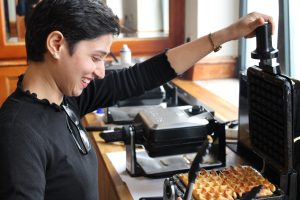
Interest sparked in the commercialisation of tourism when questions were raised about changing traditions. Social media platforms like Instagram and TikTok have given space for prior education to potiential tourist’s and has seen been an excellent marketing tool for many.
The reputable Waffle Workshop, which has received roaring reviews over the last number of years was the perfect candidate for an in-depth and passionate interview about the commercialisation of the tourism industry. The interview in question was conducted with Maria Laura Bencosme, Marketing Specialist and host of the Belgian Waffle Workshop in Brussels. Maria spoke passionately about this business, explaining its establishment in 2018. She spoke of how her boss made his student job a full-time business.
“My boss started doing the workshop at a hostel before this as a student job. And because he was working with so many tourists, he thought wait a minute, what are people looking for in Belgium? Easy. Waffles, beer, and chocolate. So, he’s like, okay, what can I teach people to do? Beer? It’s a little more complicated and easier to just drink. So, he then decided to settle on Chocolate and Waffles.”
Having derived from a student job, it’s easy to see how this small setup quickly became a passion project. While competitors exist, Maria believes that it is just that bit different at ‘Waffle Workshop’
“Modesty aside, it’s quite booked all the time. If you can make it at home, enjoy it, you can get into the culture. We go through it, explaining what the difference is between different types of waffles, how we make it, why we make it like this, how we use the irons, and then how to properly devour it. Because there’s a proper way of eating that Brussels waffle.” She laughed.
Passion aside, Maria remarked on how tradition is still well and truly alive with Waffle Workshop. Often faced with opposing opinions, it is something Maria was certain would never be lost.
“I wouldn’t say that we are moving very far away from tradition. The tradition is there. We’re still making them in those really old hot irons with the same ingredients. We use Belgian brown sugar, which is cassonade, and it’s made out of beetroot. That’s just one of the originalities and the tradition of the Brussels waffle. We do adapt because we make the workshop in English, but other than that, the rest is full Belgian tradition.”

While the waffle itself may be traditional, often the toppings are seen as the question raisers. Maria commented on what she had seen on the Belgian Waffle within ‘Waffle Workshop’.
“So, the Brussels Waffle has three main toppings. Strawberries which are seasonal, and right now we are in strawberry season, so people are putting a lot on a lot of strawberries, and then there’s powdered sugar and whipped cream. Nutella goes great with it , Spekudos which is like the Belgian typical Biscoff spread. Of course, once you get kids in the workshop and they go crazy with sprinkles and that’s not very traditional. I think it’s a little bit of both, people manage to put whatever they like on it.”
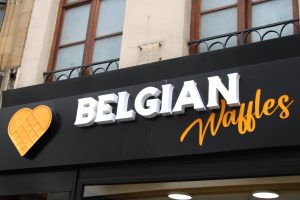
A tourist would have much to ponder while roaming the streets of Brussels, as the eye is met with beautiful architecture alongside those relentless queues for the Belgian Waffle. Struck by a particularly long queue for Brussels Waffles, it is simple to see why Cella, the proud owner of Brussels Waffle, shared briefly off the record about the rise of his dessert heaven. It was then one of his employees, who shared all his experience within this industry.
“I’ve been working in the Waffle industry for two years now. This particular shop opened two years ago. I was one of the first workers. It’s a really cool job, because you have to prepare everything from scratch but still as a job it’s quite simple and we’re not passionate about it.”
While initially it seemed that the shop clerk felt quite indifferent about working in the Waffle shop, it became clear that passion came through regardless.
“In my knowledge, the first waffle, it was just plain. So, that’s how it was eaten way before. Now with all the tourism coming to Brussels. The toppings are becoming more and more crazy, so the price is also rising a lot of that. We now see combos going for, 14 to 15 euros and having six or seven toppings- which naturally it was not like that in the beginning. I think that comes from the Americanisation, if I can say it like that or the globalisation of things, just to make the margins more and to profit more out of it. “
Referring to the Waffle industry, the employee stated that;
“I think that it should stay the same because I believe in the originality of it, but on the business side, I think that it should stay like that because it brings more money for the country. Culture-wise, I think it should go back to its roots because it’s beautiful, you know?”
While unknowingly, the clerk of Brussels Waffle had plenty of passion, perhaps this shows that tourism and how we perceive it is subjective.
Reflecting on these interviews, it would be easy to feel indefinitely about whether the Belgian Waffle is moving away from tradition. History still lingers around Belgian waffles, however, perhaps tourism will always prevail in allowing an individual to enjoy culture through major and minor adaptations. Some may say that it’s damaging to culture preservation, however others will always back that it supports the local economy. Perhaps the old age argument is not to be answered within this article, but it is just some good old food for thought.
